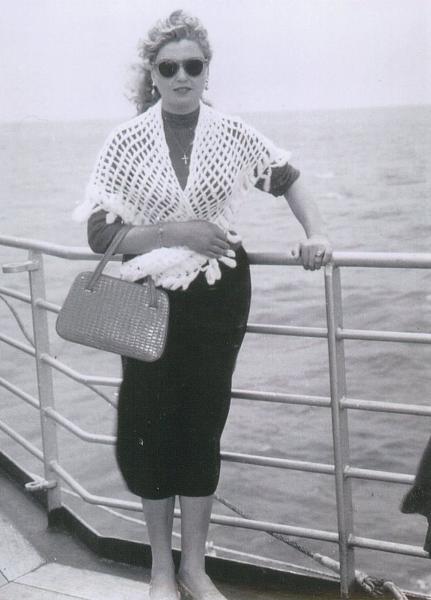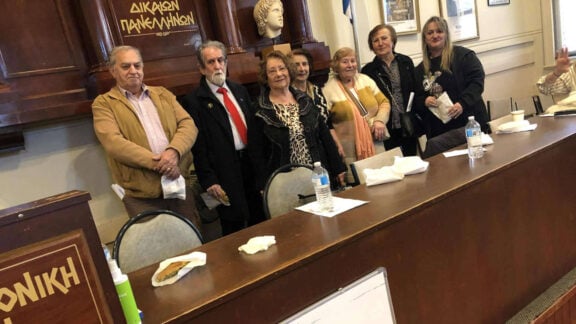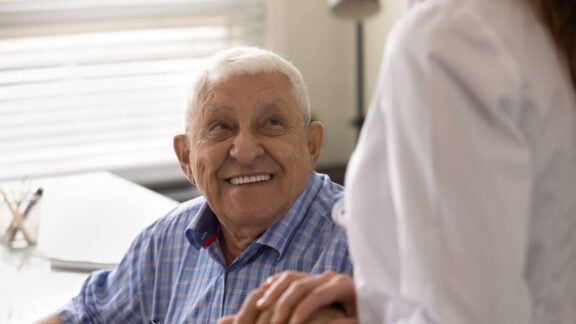Festival Hellenika paid tribute to the 900 Greek single women known as nyfes (brides), who journeyed to Australia on the Spanish ship Begoña in 1957, in a special event last month under the direction of the SA Council for the Greek Cultural Month and in collaboration with the Colossus Panrhodian Society and educator Peter Photakis. Journey in the Ship Begoña – 60 Years Then and Now reunited some of the brides of 1957 and gave them time to share their incredible migration stories, shedding additional light on the post-World War II era in which a stream of young Greek women embarked upon a journey to the unknown in a search of new horizons and the promised land where they would also meet their future husbands.
Among the 900 women who arrived in Melbourne’s Port Phillip in June 1957, was Afroditi Karatasas, a beautiful young woman who was crowned ‘Queen of Begoña’ 60 years ago.
“It is an enduring custom for every passenger ship that crosses the equator to organise a Festive Day honouring Poseidon the Ancient Greek God of the Sea,” Afroditi Karatasas (nee Athanasoulia) explains to Neos Kosmos.
“To be honest, I feel a little embarrassed talking about it. It’s the same feeling I had when the escort came into our cabin, which I shared with other girls, to tell me that the boat committee had selected me as the Queen of Begoña,” recalls Ms Karatasas whose natural beauty and majesty of spirit haven’t faded after all these years.
Afroditi originates from a little village called Lafka in Lakonia and has been living in Adelaide since she migrated to Australia. She admits with disarming candour that she never liked the village and farming life, therefore, she was the one who decided she wanted to leave Greece and travel to Australia.
“My engagement to my future husband, Giorgo, who lived in Adelaide, was agreed through correspondence with my dad. I will never forget my father coming to find me the night before the boat was scheduled to leave to make sure I didn’t have a change of heart. I was determined to go,” she admits.

During the evening the guests had the opportunity to listen to stories from other brides who came to Australia with an unwavering purpose; to marry a Greek man and start their own families away from home in the land of hope and opportunity.
Eighty-six-year-old Anna Boravos shared her own migration story, her poems on the aching feeling of nostalgia for her mother, her homeland, and all the things that haunted her as time passed by, before she took to the stage with her family and sang some Greek traditional songs with the sorrow of xenitia as a theme.
Kalliopi Florinis, another bride of Begoña, took the stage and shared her story and Vicky Fragoulis spoke on behalf of her late mother Fotini Safis.
“Tonight’s presentation has mainly focused on the experiences and memories of the young nyfes who journeyed to Australia on the ship Begoña in 1957. However, the era of the proxy brides – the nyfes as they are better known – began years prior to, and after this particular journey. Their experiences are integrated into the tapestry of the Hellenic diaspora story,” says Sabina Kelakios who, together with Thomas Boravos, presented the evening on behalf of Festival Hellenika.
“I must admit I was incredibly touched by the response we have had tonight and the feedback we have been receiving while organising this event,” says Kelakios.
“This is the story of thousands of young Greek women from various parts of Greece, who left their homes, families, and way of life and travelled to the unknown to find their destiny. Some did so willingly, others unwillingly. Whatever the case, it needs to be acknowledged that apart from the journey, settling into a new country and a new life and forging intimate and harmonious relationships with the men they came to marry had its own challenges.”
The migration of 1957 remains without a doubt a very important chapter in the history of both Greece and Australia. Those brides helped to build a thriving Greek community in a foreign land and played a pivotal role in shaping multicultural Australia.
As I looked around the room, at these brave Greek women from another era, I couldn’t help but wonder; how do these women actually feel looking back on their lives 60 years later? What percentage of those mature women would actually retrace the same path if they had the opportunity to shape their own destiny one more time? Would they actually board the Begoña once again on the night of 21 May 1957?
“For me, circumstances were slightly different, because I lost my Giorgo to a tragic accident six years after we wed, but to be honest, if I had my time again and despite the fact that I grew to love my new country, the answer would most probably be no,” concludes the 1957 Queen of Begoña, Afroditi Karatasas.








